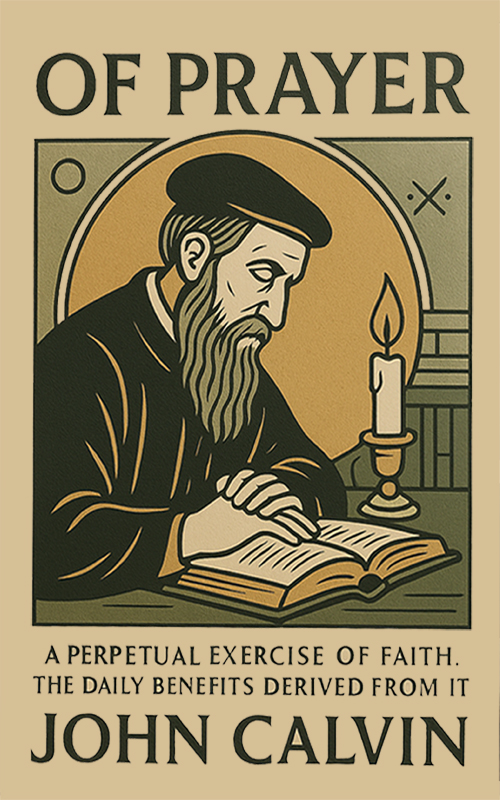 by John Calvin
by John Calvin
in ePub, .mobi & .pdf formats
In Of Prayer: A Perpetual Exercise of Faith, John Calvin opens the door to the soul’s most vital and intimate act—communion with the living God. Drawn from Book III, Chapter 20 of his Institutes of the Christian Religion, this classic work is Calvin at his most pastoral and penetrating, teaching the Church not only how to pray, but why prayer is the believer’s essential lifeline and the very heartbeat of faith.
Prayer, Calvin writes, is the chief exercise of faith—the means by which the children of God draw near, pour out their hearts, and lay hold of the inexhaustible riches that are theirs in Christ. God has revealed Himself graciously in Jesus Christ, who offers abundance for our want, happiness for our misery, and grace for our guilt. But these treasures are not ours by mere knowledge alone; they must be dug up by prayer. Just as it would be folly to know of a buried treasure and never seek it, so too is it to know the promises of God and yet never approach Him in prayer.
True prayer is grounded in reverence, shaped by Scripture, anchored in Christ, and sustained by the Spirit of adoption, who enables us to cry out, “Abba, Father.” In this sacred act, we do more than speak—we enter the heavenly sanctuary, appeal to the promises of God, and learn by experience that what we believe by faith is never in vain.
With remarkable clarity and spiritual warmth, Calvin outlines the necessity of prayer, the rules that govern it, the comfort it brings to afflicted saints, and the mediating role of Christ. His exposition of the Lord’s Prayer alone is a treasure to the Church, guiding believers to align their hearts with the will of God and approach Him with humble boldness.
This is not a book of empty theory. It is a guide, a rebuke, and a lifeline. Whether you struggle to pray or long to grow in this holy discipline, Calvin calls you to a life of honest, fervent, dependent, and believing prayer. Here, the soul finds not only instruction but rest—confidence that none of our burdens are hidden from God, and assurance that He is both able and willing to sustain us.
This edition preserves the historic 19th-century English translation by Henry Beveridge (1845), remaining faithful to Calvin’s original Latin and unmodernized for readers who value the doctrinal depth and devotional richness of the Reformation era.
-----
Table of Contents
I. The nature of prayer, and its necessity as a Christian exercise, sec. 1, 2.
II. To whom prayer is to be offered. Refutation of an objection which is too apt to present itself to the mind, sec. 3.
III. Rules to be observed in prayer, sec. 4-16.
IV. Through whom prayer is to be made, sec. 17-9.
V. Refutation of an error as to the doctrine of our Mediator and Intercessor, with answers to the leading arguments urged in support of the intercession of saints, sec. 20-27.
VI. The nature of prayer, and some of its accidents, sec. 28-33.
VII. A perfect form of invocation, or an exposition of the Lord's Prayer, sec. 34-50.
VIII. Some rules to be observed with regard to prayer, as time, perseverance, the feeling of the mind, and the assurance of faith, sec. 50-52.
